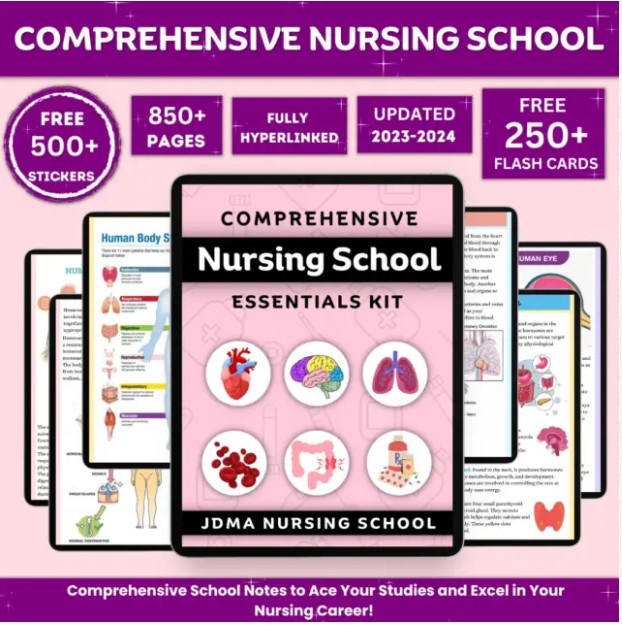The National Council Licensure Examination (NCLEX) is a critical milestone for nursing students aspiring to become licensed nurses. This exam evaluates the competency of entry-level nurses and ensures they have the knowledge and skills necessary to provide safe and effective patient care. Whether you are preparing for the NCLEX-RN or NCLEX-PN, a structured Nursing Study Guide is essential for success. This comprehensive guide will provide effective strategies, study tips, and essential resources to help you pass the NCLEX with confidence.
Understanding the NCLEX Exam Format
The NCLEX utilizes a Computerized Adaptive Testing (CAT) format, meaning the difficulty of the questions adjusts based on your performance. Key aspects of the NCLEX exam include:
- Number of Questions: The NCLEX-RN ranges from 75 to 145 questions, while the NCLEX-PN consists of 85 to 205 questions.
- Time Limit: You have up to five hours to complete the exam.
- Question Types: Multiple-choice, select-all-that-apply (SATA), fill-in-the-blank, ordered response, and hotspot questions.
- Passing Standard: The exam continues until a 95% confidence interval determines whether you have met the passing standard.
Key Study Strategies for NCLEX Success
1. Develop a Study Plan
A well-structured study plan is essential for efficient preparation. Consider the following:
- Allocate 8-12 weeks for focused study.
- Dedicate specific hours daily for review and practice questions.
- Identify weak areas and allocate more study time accordingly.
2. Utilize Reliable Study Resources
Several study materials and resources can help you prepare effectively. Recommended resources include:
- NCLEX Prep Books: Saunders Comprehensive Review for the NCLEX-RN, Kaplan NCLEX-RN Prep, and Lippincott Q&A Review.
- Online Courses & Apps: UWorld, Nurse Plus Academy, Hurst Review, and NCLEX Mastery App.
- Flashcards: Quizlet and Picmonic for quick memorization of essential nursing concepts.
3. Master Test-Taking Strategies
To tackle NCLEX questions efficiently:
- Read the question carefully and eliminate incorrect answers.
- Look for keywords such as “first,” “best,” or “most appropriate.”
- Apply the ABCs (Airway, Breathing, Circulation) priority-setting framework.
- Use Maslow’s Hierarchy of Needs to determine patient care priorities.
- Recognize and understand delegation and scope of practice for nurses and unlicensed personnel.
Key Topics to Focus On
1. Safe and Effective Care Environment
- Management of Care: Delegation, patient rights, legal and ethical principles, and informed consent.
- Safety and Infection Control: Standard precautions, isolation protocols, and medication safety.
2. Health Promotion and Maintenance
- Growth and Development: Pediatric milestones and geriatric considerations.
- Preventive Care: Immunization schedules, prenatal care, and patient education.
3. Psychosocial Integrity
- Mental Health Nursing: Anxiety disorders, schizophrenia, therapeutic communication techniques.
- Crisis Intervention: Suicide prevention, substance abuse, and domestic violence.
4. Physiological Integrity
- Basic Care and Comfort: Pain management, mobility, and nutrition.
- Pharmacological Therapies: Medication administration, adverse effects, and drug interactions.
- Reduction of Risk Potential: Lab values, diagnostic tests, and complications management.
- Physiological Adaptation: Acute and chronic conditions, emergency interventions, and prioritization.
Effective Study Techniques
1. Active Learning Methods
Passive reading is not enough. Engage with the material using:
- Concept Mapping: Visually organizing information to understand connections.
- Teach-Back Method: Explaining concepts to a peer or recording yourself.
- Case Studies: Applying knowledge to real-life patient scenarios.
2. Practice Questions and Mock Exams
- Answer at least 100-150 NCLEX-style questions daily.
- Review rationales for both correct and incorrect answers.
- Take full-length practice exams to build endurance and reduce test anxiety.
3. Mnemonics and Memory Aids
Utilize mnemonic devices to remember complex information, such as:
- MONA for myocardial infarction treatment (Morphine, Oxygen, Nitroglycerin, Aspirin).
- RACE for fire safety (Rescue, Alarm, Contain, Extinguish).
- SPICES for geriatric assessment (Sleep disorders, Problems with eating, Incontinence, Confusion, Evidence of falls, Skin breakdown).
4. Group Study and Peer Discussions
Studying with peers can provide motivation and deeper understanding. Participate in:
- NCLEX study groups.
- Online forums such as allnurses.com.
- Weekly review sessions to discuss challenging topics.
Managing Test Anxiety
1. Maintain a Healthy Routine
- Get adequate sleep (7-9 hours per night).
- Maintain a balanced diet and stay hydrated.
- Incorporate physical activity and relaxation techniques like meditation.
2. Simulate Exam Conditions
- Take practice tests in a quiet, distraction-free environment.
- Use a timer to get accustomed to time management.
- Familiarize yourself with the Pearson VUE testing center environment.
3. Stay Positive and Confident
- Use positive affirmations to boost confidence.
- Avoid last-minute cramming, which can increase stress.
- Trust your preparation and skills.
The Day of the Exam
1. Arrive Early and Be Prepared
- Bring valid identification and necessary documents.
- Dress comfortably and avoid wearing accessories that may require removal at the testing center.
- Avoid excessive caffeine intake to prevent jitteriness.
2. Read Questions Carefully
- Take your time to analyze each question before selecting an answer.
- Use logical reasoning and nursing knowledge to make the best choice.
3. Stay Calm and Focused
- Take deep breaths if you feel overwhelmed.
- If unsure about an answer, make an educated guess and move on.
- Maintain a steady pace to complete the test within the allotted time.
Conclusion
Passing the NCLEX is achievable with a well-structured study plan, effective test-taking strategies, and proper self-care. By focusing on key nursing concepts, utilizing high-quality resources, and practicing extensively, you can boost your confidence and increase your chances of success. Stay motivated, remain consistent, and trust in your preparation. Your journey to becoming a licensed nurse is within reach—go ace the NCLEX!

